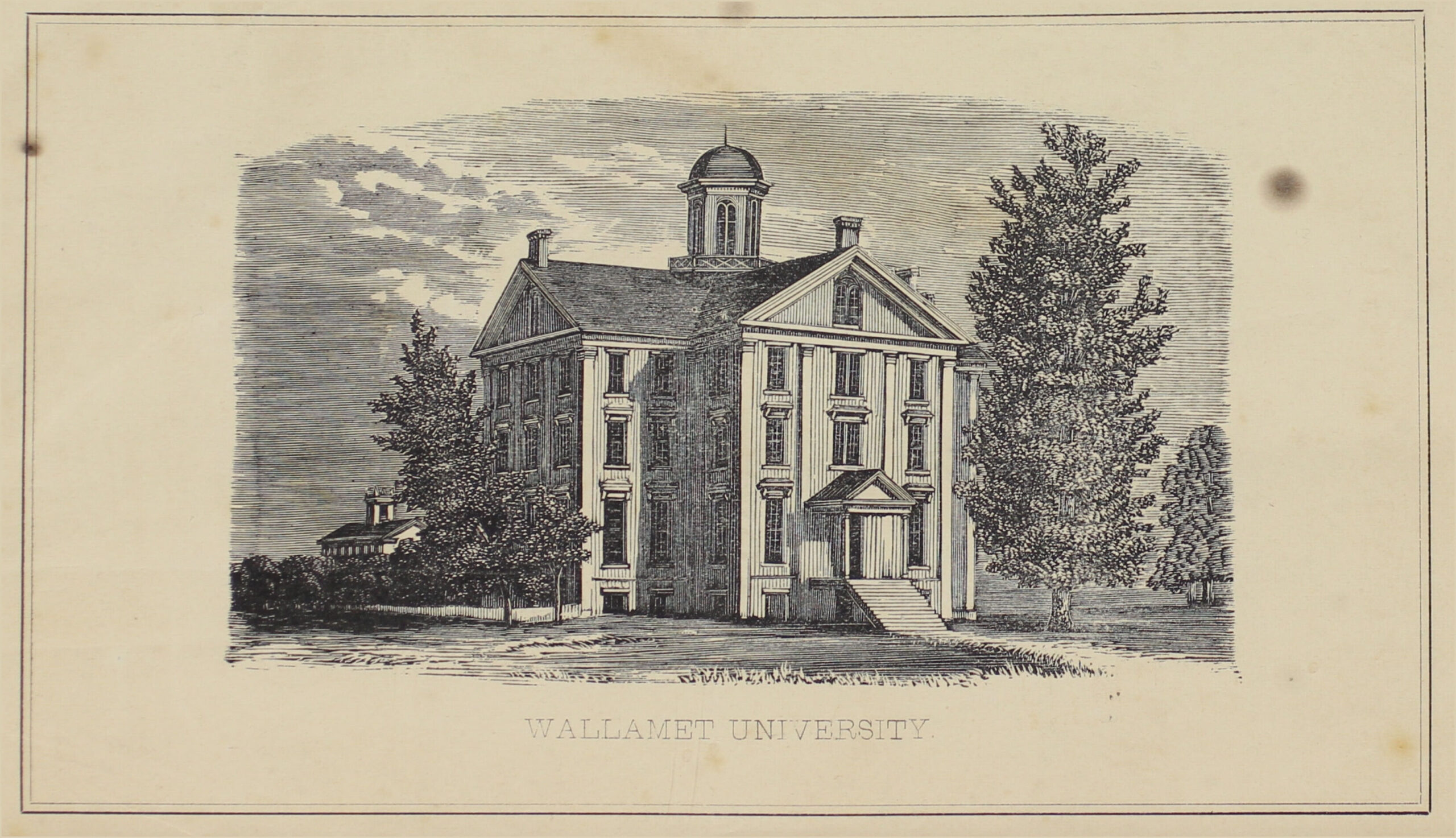Written by Eleanor Smith, Class of 2026
Nelson Rounds’ presidency was seen as “old fashioned, strict, severe” by the student body.1 While he was not as beloved as the previous presidents, he was exactly what Willamette was looking for after Wythe’s cigar smoking.
Rounds seemed to be the perfect fit for the university because of his prestigious background, on par with the former successful presidents. He was born May 4, 1807.2 He graduated from Union College in New York and was an editor of the Northern Christian Advocate for four years. He also taught Ancient Languages in Cazenovia Seminary.3 The Board was sure that “he would bring the school what they wanted. He had age, dignity, and prestige in the Church.”4 Rounds was sixty-one when he became president. Poor health had already affected his work before and had led to early retirement.5 Despite this, his traditional values and high standards were believed to be exactly what the university needed.
Rounds’ strictness was incredibly unpopular with the students. Despite the Board’s wishes, “He did not prove a Hoyt, a Gatch, or a Wythe in winning loyalty and affection from the little student group of the pioneer school.”6 While the university encouraged him to put more discipline into the school, the students disagreed with his rules. His policies were considered too outdated. A student at the time wrote, “Some of his methods did not meet with approval of many students. Such as making it necessary to obtain written consent of the faculty for a young man to speak or walk to or from the University with a young lady.”7
See page 30 of the Catalogue of the Wallamet University, Salem, Oregon, for the Academic Year 1869-70 (below) for the regulations.
One regulation many students at the time felt was too harsh was the “closing door rule.” This policy meant that at the tap of the bell, the door to the chapel would be closed and students that would not make it in time would be excluded. One morning, some students decided they had enough. Two girls were left outside in the cold and one of them kicked the door so that her foot had gone through the panel.8 After this instance and more complaints, the rule became so unpopular that the Board was forced to give in and revise it.9
Under Rounds the university did manage to grow, despite his lack of popularity among the students. In 1870, the Chairman of the Visiting Committee states “The Faculty are advancing the standards of proficiency in the prescribed studies, and as a result the different grades of students are becoming more clearly defined…The school is more and more talking on the aspect of an advanced Institution…The students are advancing in stature as well as knowledge, and in every respect are preparing to fill the measure of men.”10 In the Albany Register in 1869, Rounds mentioned how the university was “flourishing.”11 His administrative influence clearly had a positive impact on the community.
After a health scare, Rounds retired to Clark County in Washington state. He was elected as Superintendent of Public Instruction, which he served for two months until his death on January 2nd, 1874. His time at Willamette signaled the start of a change within the role of the president: as future presidents would take on more administrative duties and less professorial duties.
Endnotes
Click to expand
- ˆ Valleda Smith Ohmart quoted in, Robert Moulton Gatke, Chronicles of Willamette (Portland, Or: Binfords & Mort, 1943), 259.
- ˆ Robert Moulton Gatke, Chronicles of Willamette (Portland, Or: Binfords & Mort, 1943), 259.
- ˆ Gatke, Chronicles of Willamette, 258.
- ˆ Gatke, Chronicles of Willamette, 258.
- ˆ Gatke, Chronicles of Willamette, 259.
- ˆ Gatke, Chronicles of Willamette, 259.
- ˆ Sarah Bridges Cromwell, letter to writer (1921), quoted in Robert M. Gatke, Chronicles of Willamette (Binfords & Mort, 1943), 259.
- ˆ Gatke, Chronicles of Willamette, 277.
- ˆ Leroy S Dyar, Resolution, 1870, Willamette University Archives and Special Collections, Office of the President: Nelson Rounds Papers.
- ˆ Pacific Christian Advocate, (April 6, 1870), 2, quoted in Robert M. Gatke, Chronicles of Willamette (Portland, Or: Binfords & Mort, 1943), 278.
- ˆ “Local Affairs,” The Albany Register, August 21, 1869.
Works Referenced
Click to expand
- Cromwell, Sarah Bridges. letter to writer, 1921. Quoted in Robert M. Gatke. Chronicles of Willamette. Portland, Or: Binfords & Mort, 1943. 259.
- “Catalogue of the Wallamet University, Salem, Oregon, for the Academic Year 1869-70,” 1869. Page 30. Willamette University Archives and Special Collections, Willamette University Catalogs and Bulletins. https://hdl.handle.net/10177/12050
- Dyar, Leroy S. “Resolution”. 1870. Willamette University Archives and Special Collections, Office of the President: Nelson Rounds Papers. https://hdl.handle.net/10177/22585
- Gatke, Robert Moulton. Chronicles of Willamette, the Pioneer University of the west. Portland, Or: Binfords & Mort, 1943.
- Hines, Gustavus. “Appointment Letter”. 1868. Willamette University Archives and Special Collections, Office of the President: Nelson Rounds Papers collection. https://hdl.handle.net/10177/22594 “Local Affairs.” The Albany Register. August 21, 1809. https://chroniclingamerica.loc.gov/lccn/sn84022643/1869-08-21/ed-1/seq-3
Image Citations
Click to expand
- “Appointment Letter” to President of Willamette University, telegram, Willamette University Digital Collections1868 https://hdl.handle.net/10177/22594
- Nelson Rounds. Willamette University Digital Collections https://hdl.handle.net/10177/40687
- “Catalogue of the Wallamet University, for the year 1869-1870,” Willamette University Digital Collections, page 30 https://hdl.handle.net/10177/12050
- “Resolution”, Board of Trustees resolution regarding exclusion of tardy students from chapel, Willamette University Digital Collections, 1870 https://hdl.handle.net/10177/22585

